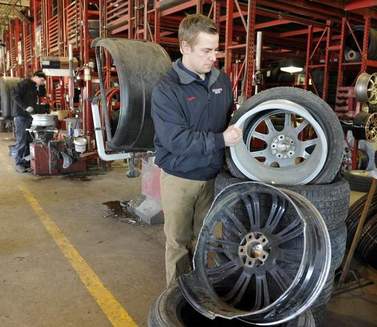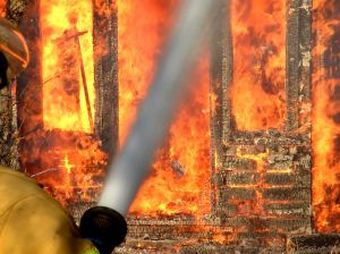
Lansing
Drivers can file claims with state or local road agencies for blown tires, bent wheel rims and other damage in what already has become an especially nasty pothole season. But their chances of collecting are slim.
Hundreds of claims filed with the state since 2010 have resulted in payouts totaling just over $3,300 to six motorists, according to the Michigan Department of Transportation. None of the 128 claims lodged between Oct. 1 and Feb. 14 has been paid, a department spokesman said.
Motorists with pothole damage in Oakland County have fared a little better. Of 75 claims filed since Oct. 1, seven totaling $3,464 have been granted, said Road Commission for Oakland County spokesman Craig Bryson.
The state takes responsibility for interstates and U.S.- and M-designated roadways; the counties are responsible for county roads.
The situation promises to worsen as a result of the extreme freeze-thaw cycle of a frigid winter and continued underfunding of road repairs. Some drivers’ frustrations are boiling over.
“We should be getting something better for all of the money we spend on the roads,” said Archie Fonville, 77, of Ecorse, who wrecked two tires on his 2006 BMW in a pothole encounter on Interstate 75 near Springwell. His November claim for $204.40 was rejected by the State Administrative Board.
Fonville said he was headed to church when the pothole loomed ahead. He couldn’t change lanes because there was truck next to him. He filed a claim for just one tire, he said, because the other one was old.
“I still feel I should be reimbursed in some kind of way,” Fonville said.
Dr. Rudolph Demercurio, a Farmington Hills optometrist, said he feels fortunate to have collected $400 from the state for two blown tires on his Cadillac from a pothole in the same area of I-75 near Springwells on a Friday evening in February 2013. His claim initially was rejected, but approved on appeal.
Demercurio said he was one of eight motorists with disabled vehicles waiting for wreckers along the interstate about 8 p.m. while State Police directed traffic around the pothole, which appeared to have been patched once and reopened.
“You drive around in Ohio, you don’t see the type of potholes we have here,” Demercurio said. “I think it’s poor workmanship, or they just don’t allocate enough money to ever fix the roads.”
Few claims eligible State law says state and local road agencies are liable only for damage from potholes that have gone 30 or more days without repair, or if negligence can be proved. It means drivers whose wheels slammed through jagged paving that appeared overnight or during the past few days are unlikely to be reimbursed.
“State law requires that to prove a highway defect claim, the motorist must show that we failed to maintain the highway in reasonable repair,” said MDOT communications representative James Lake. “They must also show that MDOT knew of the condition and had an opportunity to repair it, or the condition existed for more than 30 days.
“Few claims are eligible for payment because potholes form quickly, and when we become aware of them, we work quickly to repair them,” Lake said. “We don’t want vehicles to be damaged, or anyone to be hurt.”
Of claims paid in the past few years, Lake said, the average claim was $555, with a low of $205.49 and a high of $999.99. The most common types of damage are blown tires, bent rims, damaged suspension or damaged steering, he said.
The State Administrative Board, not MDOT, makes the final decision if a claim for less than $1,000 is rejected and the driver appeals. MDOT’s data show that in addition to the six claims paid since 2010, another 44 were rejected on appeal to the State Administrative Board, whose members are the governor, lieutenant governor, secretary of state, attorney general, state treasurer, superintendent of public instruction and transportation director.
Drivers with damage exceeding $1,000 have to file complaints with the Michigan Court of Claims in Lansing.
Other states handle pothole claims differently. In Ohio, drivers with damage worth $10,000 or less file with the Ohio Court of Claims. According to the Ohio Supreme Court’s news site, drivers must show the state highway department had been notified of a pothole and failed to repair it.
The Ohio Court of Claims administrator decides if damages will be awarded after an 81-day process in which the highway department is allowed to file an investigative report and the motorist can reply to the report. If the claim is denied, the motorist can appeal to the claims court judge.
The Illinois Department of Transportation requires “prior notice” and “an adequate length of time to remedy or repair the condition.”
Road funds lacking The normal pothole season still is a couple of weeks away, but Michigan’s rugged roads already are taking a toll and creating business for tire and repair shops.
“We have a whole stack of broken rims and split-open tires from our customers hitting potholes,” said Keith Fenwick, senior assistant manager at a Discount Tire store in Auburn Hills.
Macomb County Executive Mark Hackel said drivers’ troubles with potholes are likely to grow because the Legislature hasn’t approved the funding necessary to fix roads as fast as they’re deteriorating. A Legislature-sponsored study in 2011 showed an investment of at least $1.2 billion more per year is needed now.
“Roads are not getting funded properly year after year, and we’re still waiting for the Legislature to come up with a funding formula for it,” Hackel said.
The 2011 study showed by early the next decade the state should be spending nearly $2.5 billion more per year for repairs on state roads — let alone local roads.
Gov. Rick Snyder repeatedly has called for action on more infrastructure spending, but leaders in the House and Senate have said again this year it’s unlikely lawmakers will approve the necessary tax hikes or changes. At best, it appears they’ll use $200 million to $300 million of a nearly $1 billion state surplus to boost the road repair budget.
The situation led Hackel in late January to make public a promise for prompt response to all calls received by the county dispatch center about pothole damage to vehicles.
“We will get a crew out there and fill it within an hour, day or night,” Hackel said. “We’re not going to wait and put it on a list.”
The Macomb County executive’s pledge is prompted in part by his own experience. Three weeks ago, he hit a pothole that wrecked a tire on his vehicle on 23 Mile near Interstate 94. Coincidentally, he said, it happened in front of a tire store.
State pothole claim process Applicants for state reimbursement on pothole or “highway defect” claims must meet several criteria to qualify for payment:
■ The pothole must be located on a highway with an M, I or U.S. prefix.
■ The motorist must show the state failed to maintain the highway in reasonable repair.
■ The driver must show MDOT knew of the condition and had an opportunity to repair it, or the condition existed for more than 30 days.
■ Claims for less than $1,000 must be submitted to the MDOT regional office or transportation service center that covers the county where the incident occurred. If a claim is for $1,000 or more, it must be filed with the Michigan Court of Claims in Lansing.
A claim form and instructions are available on the MDOT website at: http://www.michigan.gov/mdot/0,4616,7-151-9615_30883-93194--,00.html.
Source: Michigan Department of Transportation
How to report a pothole ■The Pothole Hotline is 888-296-4546.
■ “Report a Pothole” is the first link in the Michigan Department of Transportation’s Spotlight section at www.michigan.gov/mdot.
■196 state highway potholes have been reported to MDOT this year.
Source: Michigan Department of Transportation
From The Detroit News
www.hub911.com




 RSS Feed
RSS Feed
